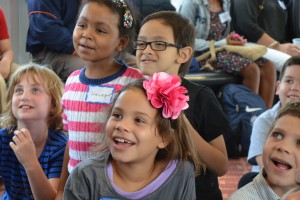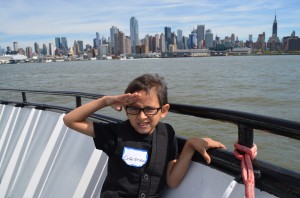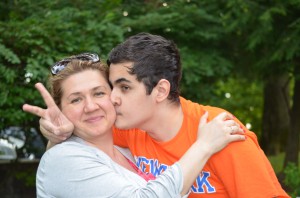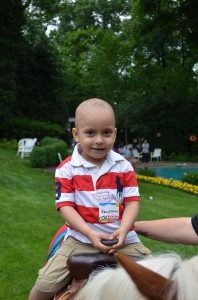Special thanks to Molly Clarke for this submission on Social Security benefits for your children. She is with Social Security Disability Help which is a for-profit organization that offers free resources and services to individuals who wish to apply for disability benefits. Making Headway Foundation has not evaluated the material below and does not endorse Social Security Disability Help. We are merely providing this information as a service to our readers.
 Social Security Disability Benefits for Children with Brain and Spinal Cord Tumors
Social Security Disability Benefits for Children with Brain and Spinal Cord Tumors
As a parent of a child with a brain or spinal cord tumor, you likely focus most of your energy on keeping your child comfortable, happy, and healthy. Unfortunately, expensive medical treatment combined with time spent away from work can cause significant financial distress.
If you find yourself struggling to maintain financial stability while caring for your child, you may be eligible to receive Supplemental Security Income (SSI) benefits on behalf of your child. These benefits can help cover everything from medical expenses to the expenses associated with daily living. The following article will provide you with a general overview of the SSI program and will help prepare you to begin the application process.
Supplemental Security Income
Supplemental Security Income (SSI) is a disability benefit program offered by the Social Security Administration (SSA). SSI is intended to provide benefits to disabled individuals who earn very little income. To qualify, applicants must fall within very strict financial limits. Because children do not earn income and are not responsible for finances, child applicants will be evaluated based on a portion of their parents’ income and resources. This is called deeming. To learn more about deeming and SSI, visit the following page: http://www.socialsecurity.gov/ssi/text-child-ussi.htm.
Applicants who qualify for SSI benefits also automatically qualify for Medicaid. Even if the SSA eventually determines your income no longer fits the parameters for SSI benefits, your child may still be able to retain Medicaid coverage.
Medical Eligibility
In addition to SSI technical criteria, applicants must also meet certain medical criteria. These criteria are listed in the SSA’s guidebook of medical conditions and requirements. This guidebook is most commonly referred to as the Blue Book.
Most brain and spinal cord tumors fall under Blue Book listing 113.00—Malignant Neoplastic Diseases. Some of the most common tumors—medulloblastoma and glioblastoma multiforme, among others—are named in this section. In general, the SSA evaluates all malignant neoplastic diseases using the following criteria:
- The origin of the malignancy.
- Extent of involvement.
- Duration, frequency, and response to antineoplastic therapy.
- Effects of any post-therapeutic residuals.
In most cases, benefits are awarded with medical confirmation of diagnosis and medical confirmation that the tumor has advanced despite treatment.
Brain tumors are also listed under Blue Book listing 111.00—Neurological Disorders and are evaluated based on impaired neurological functioning. This may include convulsive or non-convulsive epilepsy, motor dysfunction, and communication impairment. Additionally, your child may qualify under Blue Book Listing 112.00—Mental Disorders if a spinal cord or brain tumor has resulted in intellectual disability, mood disorder, or other mental impairment.
View all Blue Book listings, here: http://www.ssa.gov/disability/professionals/bluebook/ChildhoodListings.htm.
In some cases, childhood brain or spinal cord tumors will be eligible for Compassionate Allowance processing. The Compassionate Allowance program was established to help individuals with severely debilitating conditions to receive disability benefits in as little as ten days. Childhood brain and spinal cord tumors that are eligible for Compassionate Allowance processing include the following:
- Astrocytoma (Grades III and IV)
- Ependymoblastoma
- Malignant Brain Stem Gliomas
- Glioma (Grades III and IV)
- Malignant Germ Cell Tumors
- Child Neuroblastoma
- Primary Central Nervous System Lymphoma
For a complete list of Compassionate Allowance conditions, visit the following page: http://www.ssa.gov/compassionateallowances/conditions.htm.
The Application Process
For child applicants under the age of 18, the application process consists of several forms and a mandatory interview with an SSA representative. Although a portion of the paperwork can be completed online, many parents prefer to complete all forms during their child’s interview.
To begin, you should call the SSA immediately to schedule your child’s interview. Due to the high volume of new applicants, you may have to wait several months before the next available appointment opens up. If your child has a Compassionate Allowance condition, the wait time will be significantly shorter.
While waiting, it is important that you use the time to prepare for your interview. This should involve collecting all of the required medical and non-medical documentation that will be used to support your child’s claim. Prepare records of medical appointments, findings of physical examinations, findings of mental examinations, records of diagnoses, treatment results, and statements from professionals who interact with your child on a regular basis who can attest to the limitations caused by your child’s condition.
If you find that you cannot track down the required information before your interview, keep your appointment anyways. Although missing information may cause delays, the SSA will help you to collect any documents that you have missed.
Receiving a Decision
If your child qualifies for Compassionate Allowance processing, you may receive a decision in as little as ten days. If your child’s condition does not qualify for Compassionate Allowance processing, you will not receive a decision for several months.
If your child’s initial application is denied, it is important that you do not panic or give up. Although being denied can be discouraging, it is certainly not the end of the road. You have the right to appeal this decision within 60 days of receiving your notice of denial. The appeals process gives you the opportunity to strengthen your child’s claim and correct any mistakes that have been made. Statistics have shown that many more applicants are approved during the appeals process than during the initial application.
For more information about the appeals process or about SSI benefits in general, visit the Social Security Disability Help blog (http://www.disability-benefits-help.org/blog) or contact Molly Clarke at mac@ssd-help.org.





 Social Security Disability Benefits for Children with Brain and Spinal Cord Tumors
Social Security Disability Benefits for Children with Brain and Spinal Cord Tumors 2nd Annual Brian McCabe Drive For A Cure Monday, October 7, 2013
2nd Annual Brian McCabe Drive For A Cure Monday, October 7, 2013



 Here is a link to a good article from Forbes. If you donate to charity using non-cash means, you may want to read this.
Here is a link to a good article from Forbes. If you donate to charity using non-cash means, you may want to read this. Instagram
Instagram